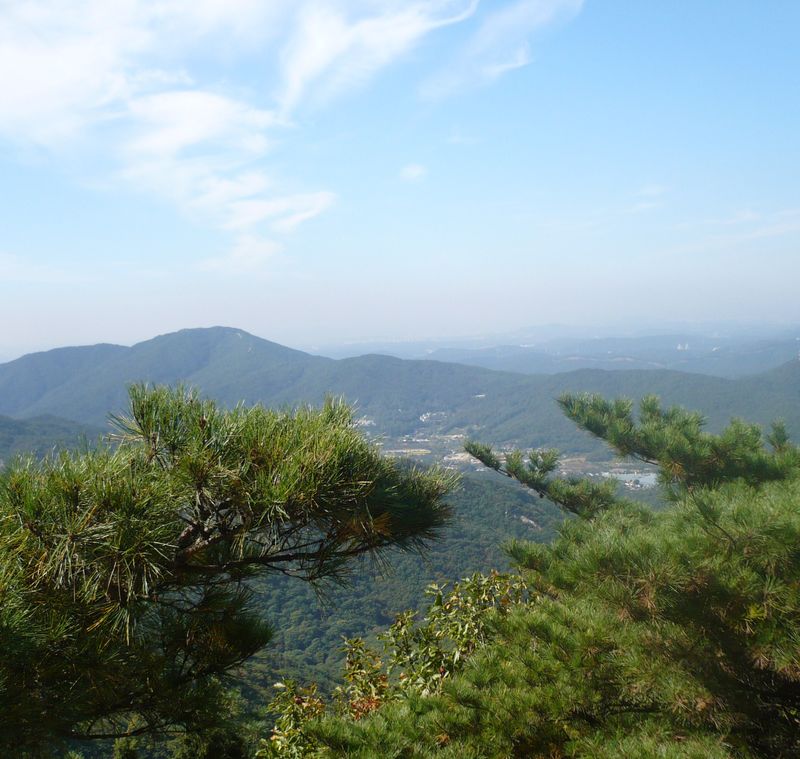It’s a rare foggy night in Ilsan. And somewhere along the way, it suddenly became deep autumn: the trees are all turning yellow and gold fast, and leaves are piling up on the sidewalks.

I dreamed about my cat (ex-cat?) Bernie, last night. It was sad, as yesterday I’d gotten an email from my brother (who shares partial custody of her, I guess you might say, with my father), saying that she was seeming sick, and so he’s taking her to the vet.
In my dream, I was visiting some people (unspecified people), and they had cats. The cats were all very friendly with me. But then I noticed that Bernie was there, too. But she wasn’t being friendly. She was sitting very quietly, looking at me in the distrusting way cats have of looking at you. A fairly transparent dream – my guilt over having left her when I came to Korea, right?
![]()
Caveat: 라이프이즈굳빰빰
“ra-i-peu-i-jeu-gut-ppam-ppam” = “life is good [konglish] bam bam” this is some kind of a song lyric, which I saw as a text-message on a student’s cell phone.
And the students in the same class declared, “Oh, she should be your daughter!” I was surprised, “Really? Why?” “Because she is always happy.” Does this mean they see me as “always happy”? That’s another triumph for my ability to forget my frustrations at the doorway to the classroom, and be on my best for the students.
Meanwhile, Obama took one step closer to his ultimate destiny: to be Space Emperor. Here is an electoral map I found, valid as of 11 pm Korea Standard Time:
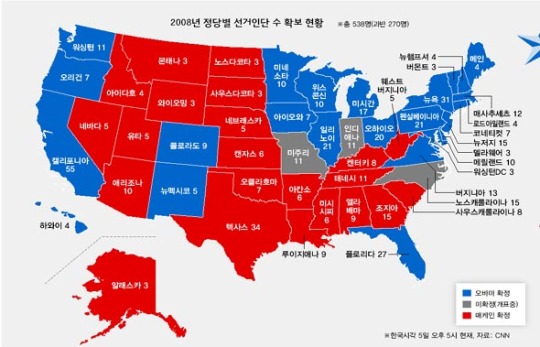
![]()
Caveat: Space Emperor Obama, Quoting Lincoln
Space Emperor Obama's book, The Audacity of Hope, gives clear evidence of his dangerous socialist tendencies… as, for example, when he quotes that proto-communist, Lincoln, on page 188. The future Space Emperor writes:
Caveat: Extratoritory
Christine, a coworker, reported that a student was inventing words in her class today. This is not uncommon, but I liked the reported student's efforts today especially:
extratoritory — a law where the president can do whatever he wants.
Caveat: 수건돌리기
On Friday, my “Indigo” students (2nd and 3rd graders) taught me the game called “수건돌리기” (su-geon-dol-li-gi which is translated in naver’s dictionary as “drop the handkerchief”). We played it during the last 5 minutes of class, because we had extra time because I’d cancelled a vocabulary quiz. They were very hyper because of the halloween candy in circulation, so it seemed best to let them work off energy. It’s a bit like musical chairs… with lots of screaming and running around. It was fun.
Caveat: Space Emperor Obama, Chasing Cars…
Peggy Noonan (former Reagan staffer), writing for the Wall Street Journal (a decidedly right-leaning newspaper if ever there was one) about Barack Obama: “One wonders if in the presidency he’ll be like the dog that chased the car and caught it: What’s he supposed to do now?”
This actually very concisely sums up some of my own misgivings about Obama. But… the alternative is worse. I keep repeating that to myself, like a little mantra. I believe that. McCain is erratic, and he has no chance of (or seeming interest in) behaving moderately in the realm of foreign policy. Further, his age and health combined with the Republican’s choice of Palin for the vice-presidency is utterly terrifying, and actually calls to mind Heinlein’s prediction that the U.S. would become a religious dictatorship sometime in the early 21st century. Anybody willing to concede the possibility that a rapture-believing yet undeniably charismatic Christian fundamentalist Sarah Palin in the White House would work to accelerate America’s move toward an undemocratic, imperial presidency with an inflexible, Bible-prophecy-driven agenda?
Therefore, with Noonan’s caveat firmly in mind, I nevertheless reiterate my endorsement of Obama. For what it’s worth. So, at the risk of seeming vaguely partisan, here are some supporting quotes. Or… are they?
Jon Stewart, a few nights back (and this is totally a paraphrase, since I didn’t see the transcript): “Update from the Future: Space Emperor Obama has now successfully spread communism to the Zykon Galaxy.”
And, in an interview Obama had with Stewart, after his infomercial on Wednesday night, Obama said, melancholically: “it’s not very funny: cooperation.” Why does Barack remind me of my father? He’s more my age, than my father’s. But his manner, his cool affect (and/or eerie lack thereof) definitely remind me of my dad, sometimes.
Obama’s accent is my dad’s, too: generic Western American (as befits a man raised in Hawaii, right?). The very complex vowel clusters of westcoast English, but none of the southern and britishish diphthongs that make my mother’s accent so distinctive, for example, nor the upper midwestern level vowels that have tinged my own accent at least somewhat (although I still probably sound more western than midwestern). Obama can “talk black” if he needs to, kind of the way I can talk Minnesotan if I want to: years of immersion can give one a facility for switching accent-codes. But his fallback accent is very western and profoundly “white,” and that’s probably partly why this black man may soon be our next president.
 Lastly, while cruising Second Life the other day, I found a political “lawn sign” that I thought was subtle and hilarious – see picture at right. It was attributed to Comedy Central (which is what sent me fishing around Comedy Central’s website in the first place and led me to the Jon Stewart quotes above), but a bit of googling yielded zero results for phrases like “vote fossil” or “dirt first.” So I will have to settle for a screenshot of the sign, since I can’t find/verify the source for a proper attribution.
Lastly, while cruising Second Life the other day, I found a political “lawn sign” that I thought was subtle and hilarious – see picture at right. It was attributed to Comedy Central (which is what sent me fishing around Comedy Central’s website in the first place and led me to the Jon Stewart quotes above), but a bit of googling yielded zero results for phrases like “vote fossil” or “dirt first.” So I will have to settle for a screenshot of the sign, since I can’t find/verify the source for a proper attribution.
It’s a funny moment, too, when Bill Kristol (editor of the very conservative Weekly Standard) channels Jesse Jackson (“Keep hope alive!”) in support of John McCain. A bit earlier, Kristol said (again, I’m paraphrasing), “If you’re a liberal, vote for Obama. If you’re conservative, vote McCain. It’s not a psychodrama, it’s an election.” I would basically agree with that… except, does that make me a liberal? Am I comfortable with that label? Seems like, only sometimes.
Speaking of the Comedy Central website, I also enjoyed the tiny informational message at the top of the page – see the center of the screenshot below:

In unrelated news, I think this is very interesting. It is now possible to get the Chinese Internet Experience (i.e. censored) outside of China [UPDATE 2020-03-27: link does not work]. I’m not sure what this would be for, but it seems to fit with the tagline of one of the people who commented on the article: Hack the Planet. I like it, though I doubt I have any use for it whatsoever.
![]()
Caveat: Boo
Today is Halloween. It wasn't the big deal it was at the Tomorrow School last year, when we had two days of activities and parties and special events for the kids. And I got to do face painting, since, somehow someone decided I was the "artistic one" among the foreigners.
No, at LBridge it was just another day, but with a large amount of candy in circulation, and some of the staff had orange plastic pumpkins. And one boy, Jin, brought a plastic scythe to class… like the kind a grim reaper might use. But I'm not sure he was going with the principle of Halloween specifically, or whether it was more of just a general mayhem type thing. Of course, the same doubts might be harbored with respect to how US residents approach it.
Yesterday I saw a former LF student in the stairway, and he seemed overjoyed to see me. I guess he's abandoned whatever other activity or hagwon he'd been involved in and is starting at LBridge. I don't think I'll have him in any class, though.
I'm trying to write a longer composition, which includes arguments about why I'm feeling so compelled to stick this thing out, despite the problems. When I get enough written, I'll put it up here. Tentative title: "My Korean Childhood."
Caveat: 행복하길바래
I keep trying to learn songs I don’t particularly like. It doesn’t progress well.
Here is a youtube of a popular song I genuinely like a lot. But there’s no way I can imagine singing it… it’s very operatic in its original presentation, not the sort of thing suited by my untrained and lousy singing voice. But I’m working on the lyrics simply because it’s on heavy rotation on my MP3 player, so I like to try to follow along.
The singer, 임형주, is what’s called a “popera star.” So I assume the style is Korean popera. Which is sort of what it sounds like. I’m not sure if it’s really a seperate genre. I found the song attached to a drama I watched.
Here are the lyrics, with translation, that I fished off the interwebs.
Title: 행복하길 바래
Singer: 임형주
그 눈속에서 너는 또 다른 곳을 보며 울었어..
그러는 니가 너무 미워서 나도 따라 울었어..
그리워 난 니가 너무 찢기도록 나 아파도
나 죽어서도 내 사랑으로 너 행복하길 바래..
힘이들어 돌아보면 나 거기에 늘 있는걸
그 곳에다 남겨두고 온 니 눈물 때문에..
나 떠난 자리에 너 혼자 둘수 없어..
있었던게.. 이제는 널 너무 사랑해..
갈수 없는 이율 댔어..
그리워 난 니가 너무 찢기도록 나 아파도..
나 죽어서도 내 사랑으로 너 행복하길 바래..
너 행복하길 바래.. 행복하길 바래..
Translation:
You turn your head and crying
I hate you being like this, that’s why I’m crying too
I’m missing you, missing you so much that I’m hurt
Hope you’ll be happy with my love even if I’m dead
Haaa…..
Turn your head if you’re tired, I’ll be there
Because I left your tears behind
I left you first because I don’t want to see you alone…
Since now I can’t love you anymore
I’m missing you so much that I’m hurt
I hope you’ll be happy with my love even if I’m dead
I Hope you’ll be happy….hope you’ll be happy
Caveat: Minor Chords
 Sometimes I log into Second Life and mindlessly drift around. It’s a virtual universe, often mistakenly called a “game” but in fact more like a shopping mall for everyone’s id–there’s no plot, no objective, no theme. Just everyone’s craziness touching up against one another, kind of like in real life, but without the social risk, maybe.
Sometimes I log into Second Life and mindlessly drift around. It’s a virtual universe, often mistakenly called a “game” but in fact more like a shopping mall for everyone’s id–there’s no plot, no objective, no theme. Just everyone’s craziness touching up against one another, kind of like in real life, but without the social risk, maybe.
I’ve adopted a “skeleton” avatar. See picture. I go to virtual nightclubs and learn about new Industrial / Gothic music, which perhaps appeals to me because of the predominance of minor chords. My skeleton dances to the music. See picture. Sometimes I take note of music I like, and go searching for it in a torrent (the latest way to download things for free, basically). I’ve found a new band I like, with the stunningly fabulous name of Apoptygma Berzerk. I’m stuck on a song called “Kathy’s Song.” I’ve embedded a youtube of it, below.
A lot of gothic/industrial stuff is European–especially German and Nordic. One group I rather like is Cephalgy, and their song “Hass Mich” (I couldn’t find a youtube of it). I’ve never quite puzzled out the relationship between Goth/House music and German culture, though I suppose the overlap is related to the Weltschmerz they share. Then again, I’ve got my own dukkha going, at the moment. The Koreans call it 고 (苦).
Then you hear something old, like Joy Division’s “Love will tear us apart.”
I’m hating work, but I really feel that quitting short of contract would leave me feeling more depressed than just putting up with it. I don’t deal well with feelings of failure. The weather has turned deliciously cool and fall-like. Leaves are turning color and swimming around in clear air. The clouds are no longer hazy, but fractally bounded complex objects adrift in simpsonian skies. So, at least walking to work is pleasant.
I’m gaining weight–probably related to how cortisol (stress hormone) alters my metabolism, as I’ve not changed my eating habits at all.
My stock portfolio is now officially down more than 50%. Yay capitalism!
The Korean won is now down 50% relative to where it was when I came here. Yay capitalism!
![]()
Caveat: Zero
This is a post with zero.
Caveat: Zombies
I awoke from a strange dream this morning. I wasn't going to write it down, but it's stuck with me. I was running from zombies. Where is this coming from? I think I had a strange conversation with one of my classes about zombie movies late last week, which planted the seed of the idea in my subconscious. And the dream world last night did crazy things with it. I don't have much of a clear idea of what was happening, but I was running around Ilsan trying to keep away from zombies.
Caveat: Customer not-so-connected
I got an email from a former coworker at ARAMARK. The CIO, my erstwhile nemesis, is finally gone. And the giant multi-million-dollar project that I participated (at a low level) in the initial stages of, "customer connect initiative" or CCI, is dead. After millions of dollars, and who-knows-how-many promises from vendors such as Oracle, the thing is… dead. Failed? I don't know the details, but I'm capable of imagining how it all turned out. I wonder if that means they're still using my infamous "reportomatic" to track national accounts? Should I be flattered or dismayed that such a poorly built piece of software is still in use?
Caveat: OK this is cool
I always knew amazing things were possible. But with Scotch-tape? Wow.
Caveat: Girlfriends
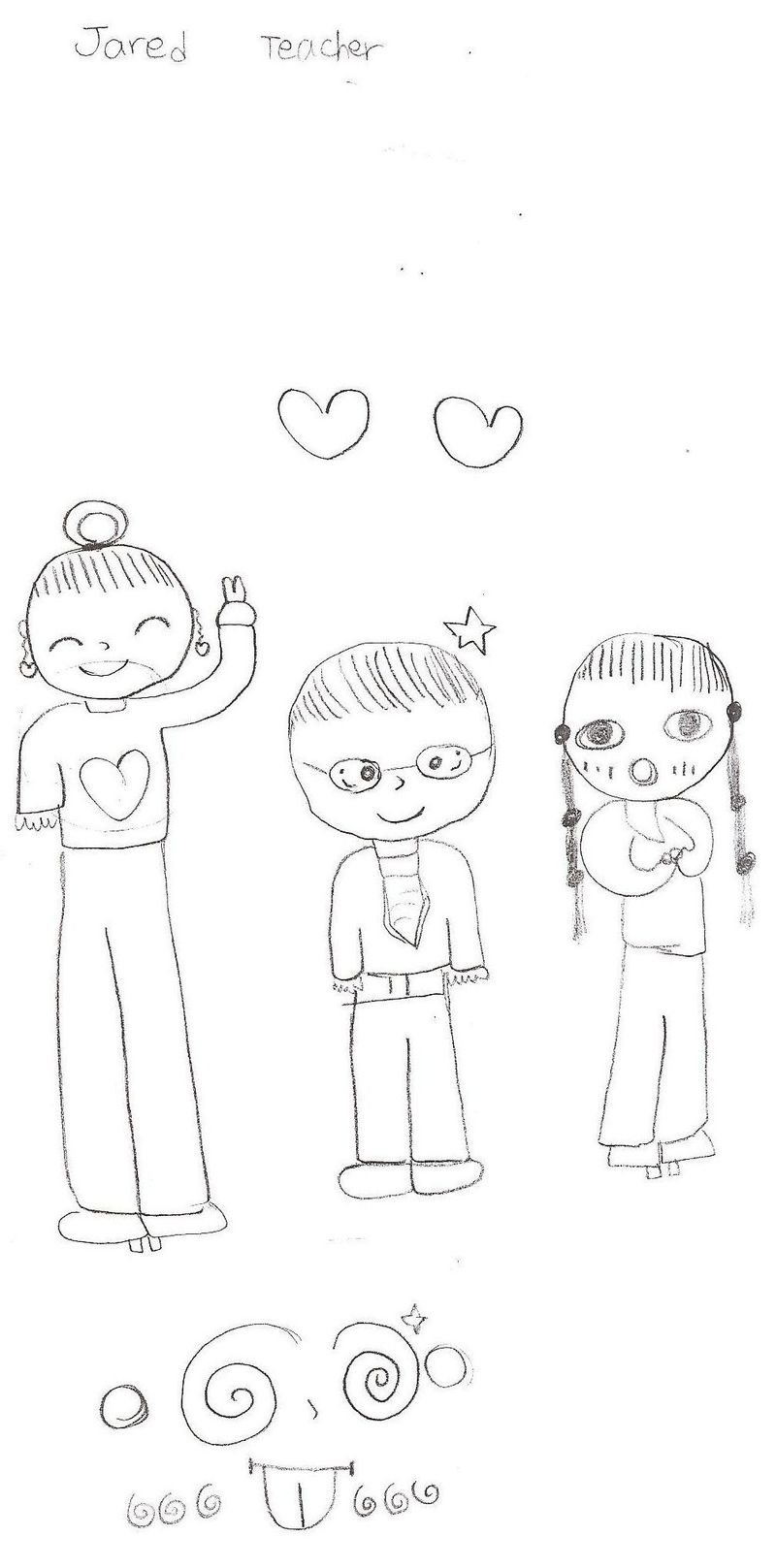 My student Kelly, 2nd grade, showed me a picture she drew of me, the other day–at left. The label says “Jared Teacher” so I assumed the middle person was me. Striking resemblance, and all. But I said, “Who are those girls?”
My student Kelly, 2nd grade, showed me a picture she drew of me, the other day–at left. The label says “Jared Teacher” so I assumed the middle person was me. Striking resemblance, and all. But I said, “Who are those girls?”
“Those are your girlfriends,” she explained confidently. Girlfriends? I have two?
It turns out… I don’t have girlfriends. But if I did, I’d be happy with those girlfriends, I think–they look very cheerful and pleasant. And the one on my right is so tall!
She’s a pretty good artist for a 2nd grader, don’t you think? I also like the Aztec-lookin thing at the bottom. It’s pretty cool.
![]()
Caveat: 있어. 없어.
I overheard two of my students arguing, today.
“있어.”
“없어.”
“있어.”
“없어.”
“있어!”
“없어!”
“있어어어!”
“없어어어!”
I was pleased to understand flawlessley what they were saying, although I had no clue what they were arguing about: “There is.” “There isn’t.” “There is!” “There isn’t!”
Caveat: Ultimatum
Well, I kind of gave my boss an ultimatum yesterday, after last weekend's depressing, discouraging experience (which was, admittedly, entirely subjective).
I told him that I wasn't very happy, and that I would like to negotiate an early end to my contract, but that I was uncomfortable with just cutting and running, as another foreign teacher at Hugok did only two weeks ago (he simply disappeared, cleared out of his apartment and sent an email, "bye"). This is not uncommon among some of the lower echelon foreign workers who come to Korea and end up disillusioned or frustrated by one aspect or another of the experience. But I don't want to be like that, I said.
We talked for a while. And here's where things stand. I will not take work home with me, ever. That's clearly not good for my personality type and for my ability to survive. I must get better at making clear when things I "must do" will not, realistically, get done in the time I have to spend on them at work–especially correcting student papers. In exchange, when I do have such unfinishable piles, I can count on him or someone to help me try to work through them somehow.
And, if that doesn't make things survivable over the contract term, he will give me a "letter of release" if I still want to leave at the end of a term–as long as I give sufficient notice and as long as it's at a good boundary between student terms. The first such stopping place is near the beginning of December. The "letter of release" will mean I cannot be "blacklisted" by Korean Immigration and thus I will be free to remain in Korea, seek another job here, etc., per whatever I might choose to do.
This seems like a very fair and reasonable basis upon which to proceed. And in good faith, I will probably be working exactly the full open hours of the academy for at least a while. Which means 11:30 to 11:30, roughly.
Caveat: Monday, 6 AM
Friday, 10:45 pm. I'm finished with work. I have about 250 papers I should correct this weekend. I'm exhausted by the long week, feeling overwhelmed.
Saturday, 10:30 am. I slept restlessly. I still have 250 papers I should correct. I call my friend Curt and tell him I don't want to meet, I'm tired. My stomach hurts. So, I read a book, but I'm feeling depressed.
Saturday, 1 pm. I finally begin to correct some papers.
Saturday, 2:50 pm. I get a text message from my boss on my cellphone–he tells me I should enjoy the day. What the hell does this mean? I now have about 230 papers I should correct. I'm working too slowly. I'm feeling discouraged.
Saturday, 7 pm. I lost momentum completely, earlier. I can't concentrate. I spend more time feeling angry about my situation than I do correcting papers. What's wrong with me? I'm a failure.
Sunday, 3 am. I can't sleep. I'm restless. Angry. I try to correct some papers, but I still can't focus.
Sunday, 11 am. I finally focus, and begin to seriously correct some papers. But I'm just TOO SLOW. I'm still only managing maybe 10 in an hour. My mind wanders.
Sunday, 1 pm. I go into Seoul and spend some time at the bookstore. But then I decide I shouldn't buy any book–what's the point? When am I going to find time to read an interesting book? I should be correcting papers. Why can't I just correct these damn papers?! I still have 190 papers to correct.
Sunday, 6 pm. I have definitely made some progress correcting papers. I'm down to around 160. I do some more on the subway, coming home. But I'm thinking to myself, what a horrible weekend. And it's my own fault–if I would quit worrying about all these papers to correct, and just DO IT, I wouldn't be so unhappy, would I? I'm a failure. I just can't handle this kind of work hanging over me. It stresses me out and makes me anxious and miserable and angry and depressed and resentful. I feel like I'm going to quit my damn job–which will only make me feel more of all those things.
Monday, 6 am. I can't sleep. I just corrected exactly 5 more papers. Now I'm down to… let me see, about 140 left to correct? This is wrong. I won't make any deadlines, this way. I feel so GUILTY. Last week, I handed over more than half my correcting load to Sarah, and here I am, fucking up and not managing to complete the half I kept. So I'm sure it's wrong to want to hand over more. What it comes down to, is that I'm just a lousy teacher. I might be doing fine in the classroom, but I'm incapable of managing my time appropriately to get all this correcting done. The irony is that a year ago at this time, I was all stressed out because I was worried I was doing badly in the classroom. Now, I look back on those times with nostalgia. This inability of mine to deal well with the stress of "homework" goes back a long way. I failed to finish my Ph.D. because of it. I can often do pretty well with situations where I have to show up on a regular schedule and get work done. My years at ARAMARK proved that. But if I get into a situation where I have work "hanging over me"–unfinished work that I carry around with me and that I feel guilty about not getting done–that seems to eat away very quickly at my soul. And it leaves me a hypocrite, beside: what right do I have to demand of my students that they complete their work in a timely manner, when I can't do so myself? Being a hypocrite doesn't sit well with me. Not well at all.
Monday, 7:15 am. So much for "Zen with a Red Pen." Eh?
Caveat: I am depressed and unmotivated
Not a great state of mind to start a weekend, is it?
Caveat: Viendo el debate presidencial en vivo en español
Esta mañana, me dediqué a mirar en vivo en el web el tercer debate, ¡en español! ¿Porqué en español? En parte, sólo por la novedad de poder hacerlo, pero, también porque brinda una cierta frescura a los mensajes ya tan aburridas de los candidatos. Es interesante como oír los argumentos de Obama y McCain en voces de traductores (en voces femininas los dos) me enfoca mejor en sus contenidos, y permite olvidar las personalidades en cierta manera.
Sin embargo, la negatividad de McCain, su postura defensiva, sobresalía en los fragmentos que escuché. Y, mirándole, con su cara de viejito enfadado… difícil de aguantar.
En otras noticias, nótese como McCain sigue algo confundido respecto al siglo en que se encuentra, mirando como parece querer cambiar las reglas (que el mismo ha ayudado en crear) bajo las cuales operan las nuevas medias.
Otra pequeña observación: nunca antes me había fijado en que McCain es un zurdo. ¿Significa algo éso?
Cita: "While America remains a center-right country, this may well be a Marxist election in which economic realities are determining the political superstructure."–Michael Gerson, in op-ed column.
Caveat: 당신은 나는 바보 입니다
Sometimes I download music without really even being sure what it is. And it sits around on my computer without me knowing anything about it, until at some point it comes around on my infinite shuffle (well, nearly infinite–last I checked, I had approximately 5000 tracks, maybe 20000 minutes of music on my computer). Anyway, a Korean pop song came around. I don’t actually like it that much… just another sappy love ballad, from the soundtrack of a drama that was popular a few years back.
But I was excited when I found myself understanding significant parts of it… whole sentences, even. That felt like a milestone. And I thought… I could learn this song. Maybe I should try. Koreans put great store in a person’s ability to sing a song or two from memory. I could really get points if I could sing something besides a few Dylan tunes in my off-key manner. Especially something in Korean–even if I don’t particularly like the song, right? I might as well try to learn something that I can more-or-less understand.
Here are the lyrics of this song, “Dangshineun naneun babo ipnida” (you [and] I are both idiots). It’s a sentiment, anyway, that I could concur with–without even knowing who you are. The artist goes by the typically monosyllabic and slightly meaningless English name of “Stay.” Here is a youtube of it.
당신은 나는 바보 입니다 / Stay
난 바보였었죠. 내가 바보였었죠.
후회해도 늦었죠 알죠 돌이킬 순 없죠
그댈 볼 수 없어요 나도 알고 있어요
내가 정말 잘못했어요 정말 미안해요
그땐 얘기하지 못했죠 너무 어리석었죠
이제와서 이렇게 애태우며 난 용서를 빌어요
당신은 나는 바보입니다
자존심 때문에
술과 쓴 담배연기로 망가지고 있죠
당신은 나는 바보입니다
아직 사랑하기에 하루 종일 펑펑 울고만 있죠
그대도 나도 모두 바보처럼
그러진 말아요 다시 생각해봐요
우리 어떻게 여기까지 힘들게 왔는데
다시 생각해봐요 후회하실꺼예요
내가 정말 잘못했어요 정말미안해요
그땐 얘기하지 못했죠 너무 어리석었죠
이제 와서 이렇게 애태우며 난 용서를 빌어요
당신은 나는 바보입니다
자존심 때문에
술과 쓴 담배연기로 망가지고 있죠
당신은 나는 바보입니다
아직 사랑하기에 하루 종일 펑펑 울고만 있죠
그대도 나도 모두 바보처럼
그대 없인 나 한순간도 살 수 없어요
머릴 잘라도 술을 마셔도 눈물만 흐르죠
당신은 나는 바보입니다
자존심 때문에
술과 쓴 담배연기로 망가지고 있죠
당신은 나는 바보입니다
아직 사랑하기에 하루종일 펑펑 울고만있죠
그대도 나도 모두 바보처럼
이제 더 이상 망가지지 마요………
[link above is broken, but here’s an embed of the same song, edited/added 2012-02-18 – this song is therefore referenced/embedded twice in this blog now, though] [further update 2013-06-29: broken link fixed again – ! %$@ copyright police.]
Stay, “당신은 나는 바보입니다.”
Caveat: Job
I awoke from a transparently symbolic yet overwhelmingly simple dream this morning. Most everything in the dream was the same as in "real life," except that my name was Job, not Jared. There were a few moments in the dream when I was reading an article on wikipedia about Steinbeck's The Grapes of Wrath. There was another moment when I stood in the classroom, and the students were asking me something, addressing me as "Job-teacher," with a long, pure, Minnesota-inflected /o/.
Upon awakening, I looked up The Grapes of Wrath on wikipedia, but the article wasn't the same. The novel wasn't even the same as in the dream–not that I remember quite how it was different, there. Somehow the dream version of the novel was less Steinbeck, more Melville. Waking up with echoes of Job left me with neurons firing associated Northrop Frye and Harold Bloom. I looked those authors up as well, and then wondered if it were possible to be a gnostic atheist. How would that work? It seems like it would lead one down a path toward one or another of those crazed conspiracy theories. Bloom, in turn, lead me, via David Lindsay's A Voyage to Arcturus, back to Alasdair Gray, whom I've mentioned before, here, I think.
The pun that is central to the dream is embarrassingly obvious, given my unhappiness with my job. I'm very glad that Freud is dead, as I'd not appreciate his making a case-study out of it.
Caveat: the neon fruit supermarket
“What thoughts I have of you tonight, Walt Whitman, for I walked down the sidestreets under the trees with a headache self-conscious looking at the full moon. / In my hungry fatigue, and shopping for images, I went into the neon fruit supermarket, dreaming of your enumerations!” – Alan Ginsberg, in his poem “A Supermarket in California,” 1956.
Completely unrelated to that, here is a picture of some people at Bukhansan National Park that I saw yesterday, doing things on ropes that I don’t know that I would have the courage to do.

![]()
Caveat: 북한산
Caveat: What’s $5000 here or there?
A friend perceptively asked me, recently, if the current stockmarket situation might be influencing my glum mood about things, lately. I often make a big deal out of the fact that money doesn't matter that much to me. But partly, that's a matter of trying to convince myself, maybe. It's not that I want to have money… but if money I already have seems to be lost or wasted, I often react irrationally, graspingly. Something of that old "scotch," behaviorally inherited from my mother's parents, via my mother and uncle.
So yes, losing $5000 in "paper net worth" in about a week is not painless, no matter what I might say or try to believe. I can take a huge amount of solace in the fact that, if my portfolio had been configured as it was up to about 14 months ago (i.e. up to when I decided to move to Korea), that disappeared $5000 would have been $20000. But, because of my decision to make my investments more conservative, I backed out a lot of my equities in August, 2006. The consequence, now, is that this current tumble is much less painful than it might have been. Still, the investments I did decide to keep were mostly of the riskier variety (including an Indian stockmarket fund [down 70% from my purchase price] and Starbucks [down 65% from my purchase price]).
Of course, the Korean currency is crashing too. Everything's crashing, one way or another. The Korean national bank is managing a sort of artificial crash for their currency (I'm guessing, here–I don't know this for sure), as this may be the most prudent macroeconomic way to try to actually, ultimately, soften the export-driven economy's landing vis-a-vis the world situation. But that means I've also lost several thousand dollars-equivalent because I am sitting on a KRW cash hoard. Now is the time to make purchases in Korea using my U.S. credit card, however–I can exploit the new lower valued-currency.
Um… what major purchase is that? I don't know. Maybe a new computer? I sure do feel unhappy with this one, sometimes. Last night I was trying to use my work website, here at home, and was getting really frustrated with the way Vista "tries too hard" to manage the non-western character encoding on the flash components (not that that's particularly robust design on the part of the Korean-based website!). The consequence was that the spreadsheets of students' grades popping up on my screen were mostly gobbledygook. Argh.
Maybe I could buy a nice computer with a Korean version of XP installed? Not sure that would ease the frustration factor – I would be exchanging neverending technical frustration with Microsoft's Vista for the linguistic uncertainties of something that is technically more robust. But…
Caveat: Hellbridge
There, I've said it. That's one of the not-so-secret nicknames that the students call my place of employment, L-Bridge Foreign Language School (엘브릿지어학원). I've decided my students are right. I'm not going to deny it or hide from it. Now, just a matter of coping.
I worked 53 hours from Monday to Friday. That's not counting the 2 hours of "obligatory social time" on Wednesday night. Nor is it counting the half-dozen hours I spent last weekend grading papers.
I'm within about a week and a half of being caught up, but because this was mid-term week, I'm already swamped again.
It was raining this morning – a cool, fall rain instead of the sticky summer type. And there was a nice chill in the air, walking home. I cooked myself some of my homemade 볶음밥, with chopped onions, garlic, chopped tomatoes and some finely chopped dried apricots that would be going bad, and kimchi and red pepper paste and rice stir-fried together with a bit of olive oil and an egg added to it.
Caveat: 미국무부, “북한은 긴장 높이는 행동 중단해야”
Headline-du-jour: US State Dept, “N. Korea-TOPIC tension high-TOPIC [again?] behavior interrupt-do-OBLIGATION… [and then what?]”. Not sure quite how to parse this, in detailed terms. But the idea seems relatively clear, given current events. I didn’t realize -야 (=[grammatically subordinate obligation]) could terminate a non-subordinate clause, however. Or that there could be two TOPIC markers in the same clause, for that matter. Perhaps it’s some journalistic shorthand? Or perhaps since it’s the rather incoherent US State Department, being quoted?
Caveat: Anna’s Dream
I received a fabulously well-written essay recently. And because we're focusing so much on revising and editing of work, I could see that it was a genuinely evolved bit of good writing – meaning the student wasn't just expressing natural talent and/or a strong and advantageous background (e.g. a past opportunity to have lived abroad). Instead, I could see how she developed her idea and then successively refined the ideas and grammar to make the final essay nearly flawless English. I penned in exactly 5 corrections – essentially zero compared to her peers. I've incorporated those corrections here. I admit I liked the essay, also, because of the more creative approach to the topic than most of the students had taken.
About 3 months ago, I had a funny and interesting dream. I'll never forget it. I was sleeping in my bedroom after I finished my school homework. In my dream, I was in a desert. I looked around and I saw a bear standing next to me. It was a polar bear wearing a cowboy suit. The polar bear turned and asked me if I wanted to try a red spotted dried snake. I ate it and it tasted really good. We started punching up all the cactuses in the desert and chased desert foxes. The time went by. Suddenly, the polar bear stopped running. I asked him why and he said this instead of answering, "It's cold, I should go home." I was surprised so much. The polar bear says it's cold in the hot desert? I knew it was a dream but it still didn't make sense. I jumped off the bed, and got out of the dream. And I saw my mom saying to me, "it's cold! So you should put your sweater on!" The polar bear wasn't the one who said it's cold. I just connected my dream and mom's talking. My family all laughed when I told them what was happening in my dream. I think I will never forget this dream.
Caveat: Zen with a Red Pen
I have long been drawn to the idea of zen-like meditation. But the fact is that I have a stunningly un-calm mind, and efforts at traditional meditation have generally failed me.
I have been reflecting that what I need to do, to meet this challenge I currently face – these massive piles of papers to grade that seem so overwhelming – is to somehow cultivate an “emptying” of my mind, around the process of having to grade student papers. Thus, I can try to turn the work with the red pen into a contemplative exercise.
Authors like Thich Nhat Hanh have written about the need to approach even the commonest of daily tasks – such as, say, doing the dishes–with a contemplative and calm and fully focused mind. And I’m not one of these people who naively believes meditation (zen-like or otherwise) requires paraphernalia of any specific kind, mental or physical. “Any activity done mindfully is a form of meditation, and mindfulness is possible practically all the time.”
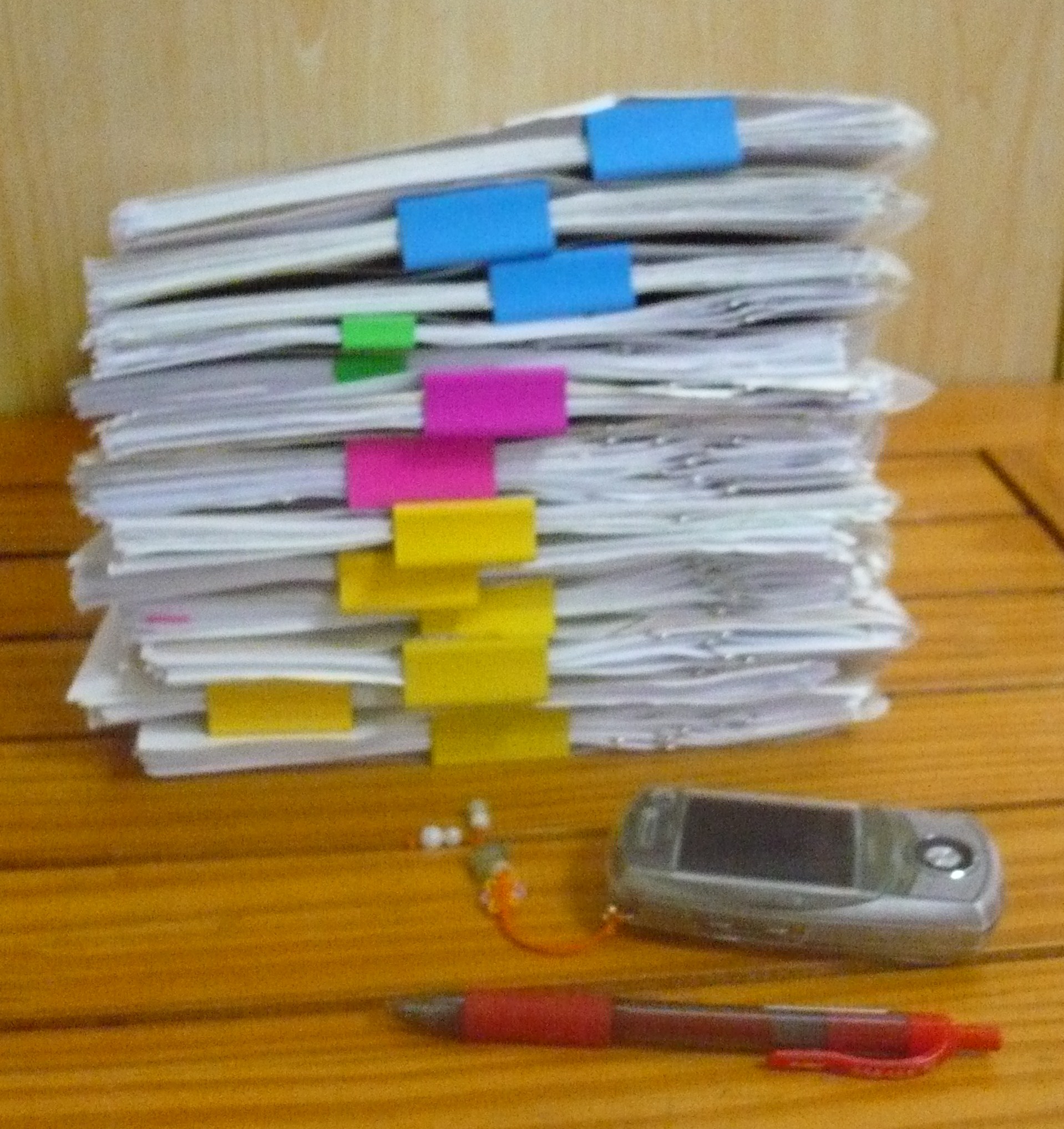 Here is picture of a typical-sized pile that I face on a weekend. So, is it possible? Can I make the massive piles of papers-to-grade into a opportunity of enter into a meditative state? I need to escape the resentment and anger I feel about it. If it turned into something calming and contemplative, wouldn’t it then be something I would be less inclined to dread and procrastinate on?
Here is picture of a typical-sized pile that I face on a weekend. So, is it possible? Can I make the massive piles of papers-to-grade into a opportunity of enter into a meditative state? I need to escape the resentment and anger I feel about it. If it turned into something calming and contemplative, wouldn’t it then be something I would be less inclined to dread and procrastinate on?
![]()
Caveat: Bono, the King of Ireland
This made me laugh, for some reason. "…Bono, the king of Ireland" – Tina Fey, pretending to be Sarah Palin, discussing her visit to the U.N. Tina Fey, pretending to be Sarah Palin, is awesome. I think Tina Fey would make an excellent vice president.
Caveat: I saw a butterfly in Hwajeong
Caveat: Benito Juárez en Seul (y ¡que pasen feliz 開天節!)
Have a happy 개천절! Here’s a statue of Benito Juarez (the “Abraham Lincoln” of Mexico) that I found on a side street in Seoul. Odd. But interesting.
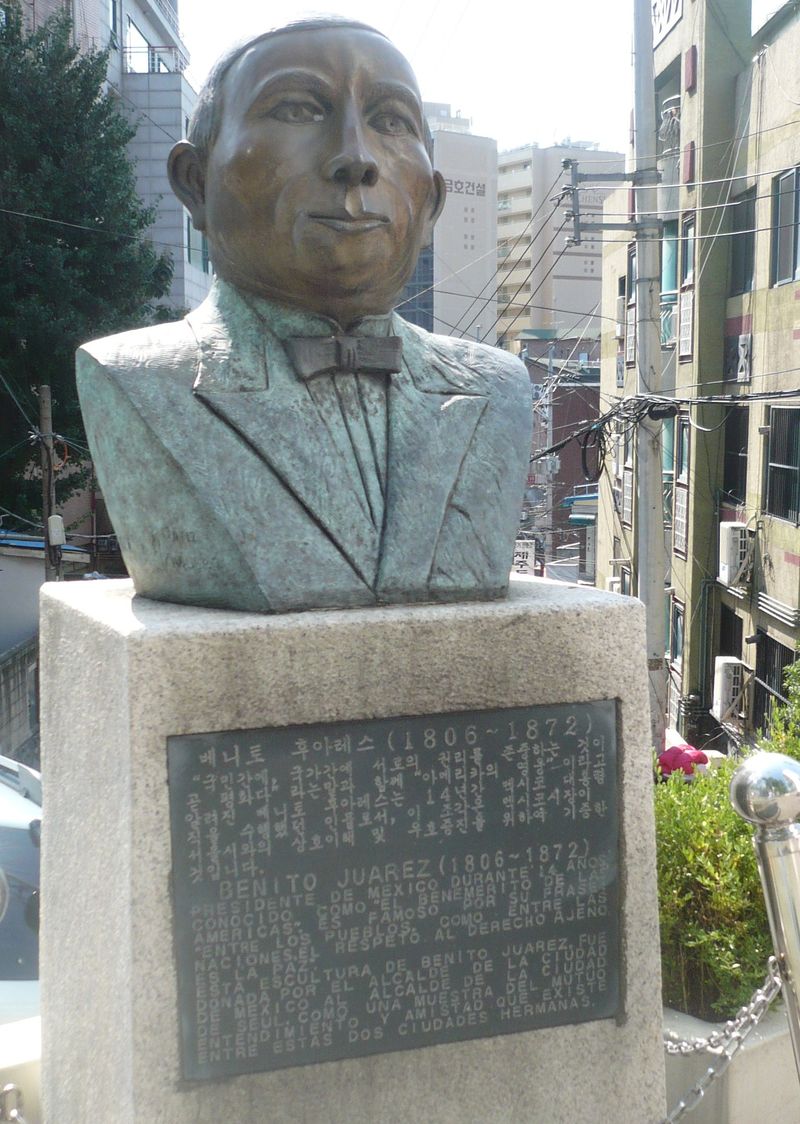
![]()
Caveat: the sky opened up…
… and something happened. I don't quite understand what it was that happened. But it's a holiday tomorrow, because of it. Sky-opening-up day. Yay.
Caveat: And?
I'm still utterly miserable with work. On top of feeling overworked, now that the new month has turned over, we (all of us teachers) are getting blamed for a sharp drop-off in enrollment at the highest levels. Which is to say, someone (parents? kids?) is unhappy with the new team make-up and/or changes to the curriculum. But the signals are mixed: too much homework? yes; not enough homework, still? yes; mismanagement of homework and/or of missed assignments by students? yes. All of the above. What's the solution? Bitch at the teachers for messing things up. And maybe it's legitimate. I'm more than 2 weeks behind on some of my grading and scoring, and I'm sure that kind of delay gets noticed by students and parents and compares unfavorably with my predecesor. What can I do? I'm already working more hours than I can bear. I'm not into this kind of stress – if I were, I'd still be working with computers for corporate America.
I'm trapped. If I resign, I get a black mark on my resume and I'll have to leave Korea – it's impossible for a teacher who has failed to complete a contract to get a visa renewal or another job in the country. That might not matter so much, if I hated Korea. But I don't. I really like it here. But additionally, if I resign, I'll have to carry around the sense of failure that will bring. I don't wanna go there. I don't see what to do, except buckle under and push on.
And?

